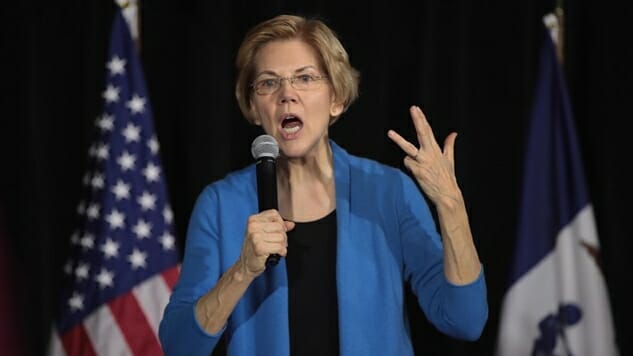Elizabeth Warren Announces A Massive Plan To Provide “Access” to Universal Child Care
Photo by Scott Olson/Getty
A little over a week ago, Elizabeth Warren formally announced her candidacy for 2020, and she is aggressively moving the policy conversation on the left to the left. She has proposed breaking up monopolies, a wealth tax on assets worth over $50 million and $1 billion, and last night, she released a child care plan that seeks to make it affordable for anyone in America to have a child (the fact that this is a major problem at all tells you how insane this country is).
The Department of Health and Human services defines “affordable” child care as equivalent to seven percent of your annual income, and Warren’s plan caps child care costs at that—meaning that parents pay for 7% of what child care costs, while the government picks up the rest of the tab. Anyone making under $50,000 a year will pay nothing in child care costs.
That’s it. No standard Democratic Party tax credit complexity or any of that other nonsense that has proven to turn people off to the Dems—the cost is just seven percent (max) for everyone making over twice the poverty line, and zero dollars for everyone under it. Aren’t simple policy explanations nice?
I can already hear the Very Serious “hOw WiLl YoU pAy FoR iT” crowd building to a hysterical crescendo at the thought of spending government money on something that isn’t the military or in the interests of billionaires, so before highlighting how Warren plans to pay for her plan that costs $700 billion over ten years, I’d just like to note that last year we increased military spending over the next two years by $300 billion, and I didn’t hear many deficit scolds shrieking about paying for that needless handout to the Lockheed Martins of the world.
Underappreciated context:
The Defense budget has been relatively constant for the last decade despite U.S. troop deployment being cut in half and the Pentagon never completing an audit. Ever.
And we spend more on the military than the next 10 nations combined. https://t.co/idJIx46xWp
— Matt Fuller (@MEPFuller) February 19, 2019
The answer to how we will pay for this huge new social welfare program is Warren’s aforementioned wealth tax on assets over $50 million and $1 billion. Her proposed tax is estimated to raise $2.75 trillion over the next ten years.
And that’s where the political genius of this idea kicks in. To oppose this plan means arguing that Jeff Bezos shouldn’t have his wealth over $1 billion taxed at a measly three percent to pay for childcare. Warren’s team deserves a ton of credit for crafting a program that not only looks to be pretty good policy (in addition to this massive subsidy, she is adding a bunch of new policies to this proposal, like enforcing standards taken from the widely-praised U.S. military’s universal child care program), but for also preemptively backing her detractors into a corner.
Tax billionaires to pay for happy and healthy children
This is what moving the Overton Window looks like. By planting a stake in the ground and making childcare a major part of her platform, Warren is forcing other contenders to meet her on this battlefield, which will (theoretically) force the political press to cover it. Hillary Clinton also had an aggressive childcare program that was probably the most liberal part of her 2016 platform, but the press never latched on to it because there is very little conflict on that topic to mine for ratings gold (2016 proved that if major decisionmakers in American media could only produce journalism or reality TV-style conflict, there is really no question as to which they would choose—as demonstrated by former CBS CEO Les Moonves’ famed 2016 quote, “[Trump] may not be good for America, but it’s damn good for CBS”).
No one wants to publicly oppose making children’s lives better while making it affordable for parents to have kids, so the GOP strategy in 2016 was to ignore Hillary’s plan, and the media followed suit—despite it being a regular feature of her stump-speeches. The hope this time around is that by announcing this before other contenders have really fleshed out their platform (Kamala Harris announced her 2020 candidacy before Warren did and she has yet to even put a policy section on her 2020 website as of this writing), Warren will create a dialogue that will ultimately become a national conversation.
By making the simple case that child care in this country is too expensive, therefore the richest people should pay a little bit more to make it less expensive for the rest of us, Warren is getting out in front of the inevitable deficit scolds that dominate the elite institutions in the Democratic and Republican parties, as well as their chief enablers throughout major media. This perpetual “but deficits” counter-argument to anything that isn’t military spending, oil subsidies (we hand out $20 billion per year to the billion-dollar companies bringing about the apocalypse) or a tax cut is being put on the defense before they can even articulate their argument. If this move seems out of character of the last forty years of Democratic politics, that’s because it is.
This is what smart politics looks like.
It must be noted that Warren is far from a trailblazer on this subject—she’s just aggressively pushing the party to the left with this move—and child care is a policy that has risen in prominence within the Democratic Party recently, as The Huffington Post noted:
In the 2016 Democratic presidential campaign, both Bernie Sanders and Hillary Clinton called for major new child care initiatives — and Clinton, who had a long history of advocacy on the issue, indicated that she intended to give it high priority if elected. But these proposals got little media attention and there were no signs they got the attention of voters, either.
In 2017, Sen. Patty Murray (D-Wash.) and Rep. Bobby Scott (D-Va.) put together a major new bill called the Child Care for Working Families Act, which has similar goals to Warren’s proposal but differs in the policy particulars. Murray and Scott have said they have said they intend to introduce an updated version of their legislation this year.
Now, this news isn’t all sunshine and rainbows. One of the biggest problems in Democratic politics is the capitalist crutch that is “access,” and that is the crux of Warren’s plan. Sources told HuffPo that “the plan seeks to make access to child care universal,” and that is very different from simply creating a government plan that seeks to make child care universal.
The difference is that “access” means subsidizing parents’ dollars going into capitalist industries that still have a profit motive, while a plan where the government takes the lead means destroying those capitalist industries and creating replacements for them where affordability and access are not even questions. Free means free.
If that sounds radical to you, keep in mind that Amazon paid ZERO income taxes on $11.2 billion in PROFIT last year—America gives away plenty of free stuff, you just have to have at least two commas in your net worth to qualify for all this free stuff.
A lot of this subsidy is going to go into a private system that Warren is rightfully declaring to be insufficient. The story we experience every day in America is that profits do not automatically equal value creation, and so long as we have a child care system that is fundamentally centered around private profits and not the health of the kids and their parents, it will continue to be too costly and inefficient—no matter how much money you throw at it.
Jacob Weindling is a staff writer for Paste politics. Follow him on Twitter at @Jakeweindling.







































